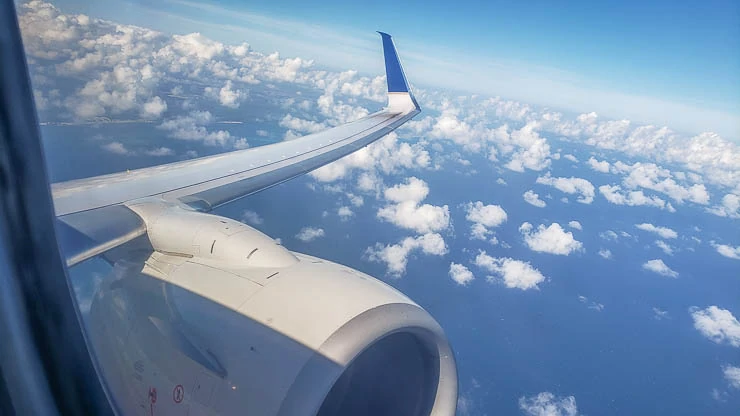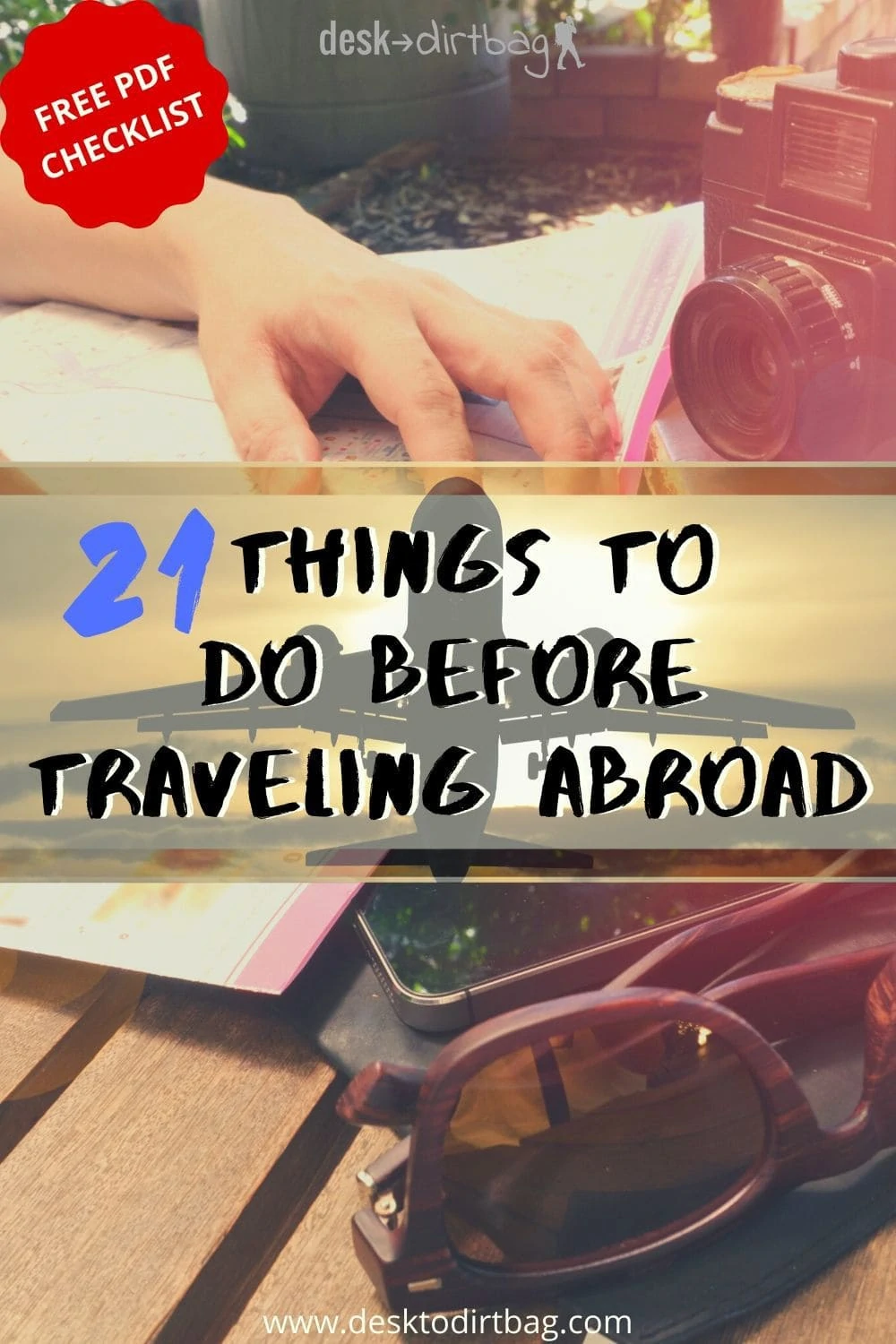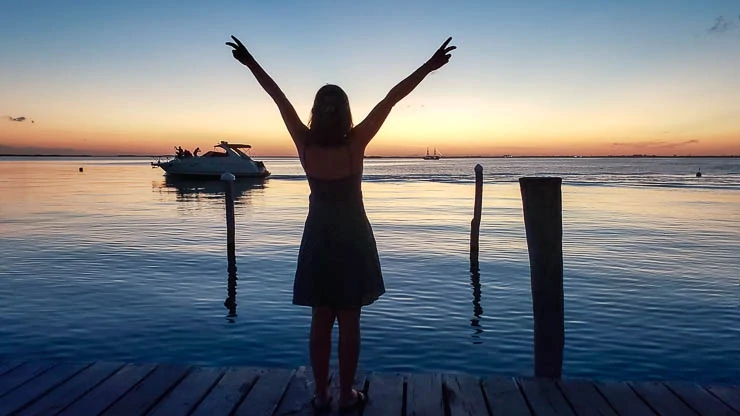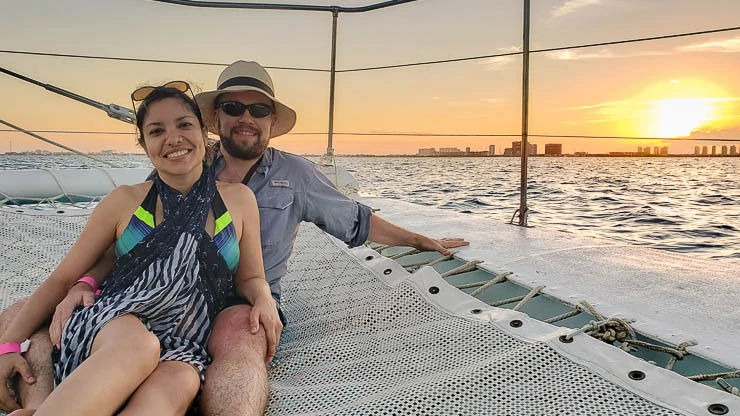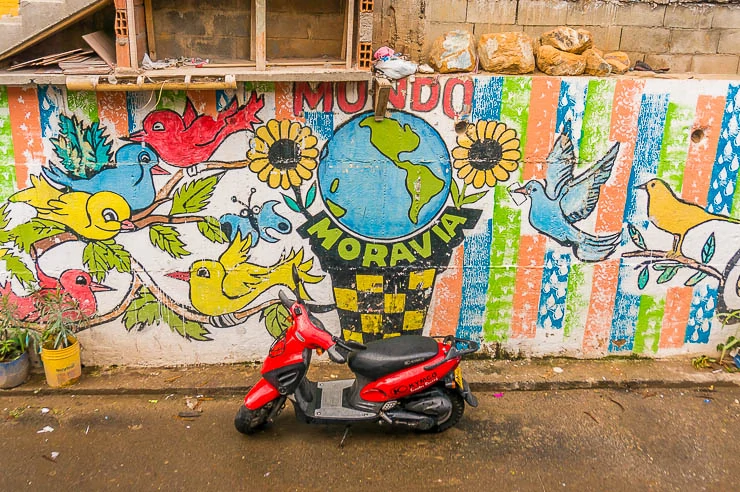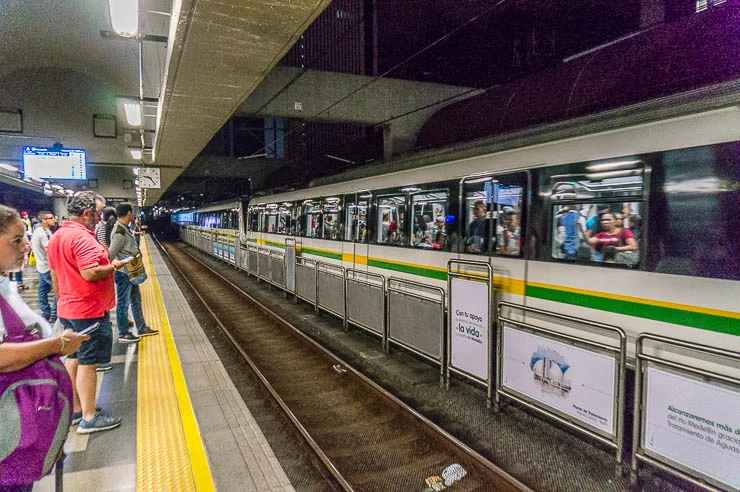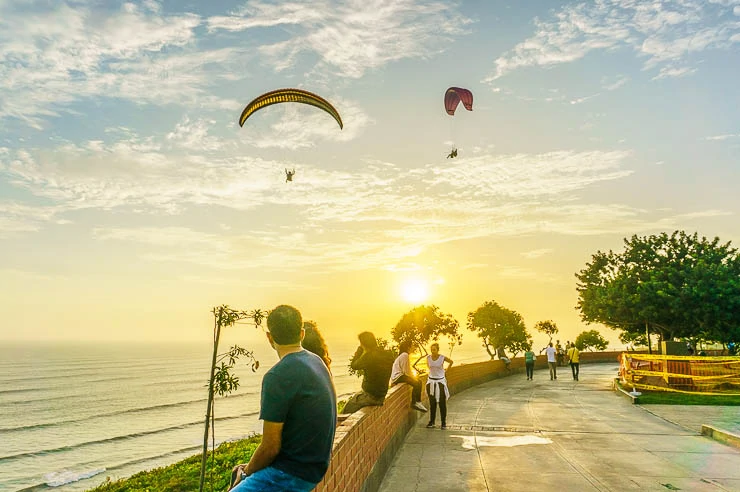There’s nothing quite like the excitement of preparing for a big trip abroad. It doesn’t matter if you’re setting off on a way ticket to backpack around the world for a year or just heading out for a two-week vacation to Europe. It’s always a thrill to plan a trip! Unfortunately, in our excitement, we can often forget a crucial step that we should have done, so that’s why we put together this list of things to do before traveling abroad. It should jog your memory and ensure you don’t hop on the plane having forgotten a crucial step.
Of course, we won’t be talking about way too obvious things like pack your luggage, get someone to feed the pets and water the plants, but rather a few less obvious things that both novice and expert travelers alike sometimes fail to take into consideration. Not every single step will apply to every person and every trip, but they are all here to jog your memory and ensure you’re properly investigating a few common things to do before traveling abroad.
Let’s get on to our list of what you should keep in mind before you set out to the airport, some of these are things you should do a few months beforehand, while others can be done in the days before departure.
Be sure to grab the FREE PDF checklist at the end of the article if you need a printable reminder.
Set Bank Travel Notifications
Make sure to either call your bank or log in to their online portal to set travel notifications about your upcoming destinations. This goes for the bank handling your debit card as well as your credit card. Transactions may be declined when there are strange charges unexpectedly occurring half a world away from where you normally purchase things.
It goes without saying, but it is a big hassle to not be able to pull cash out when you need it or to have a purchase declined at your hotel, a restaurant, or the supermarket. You can avoid this by simply notifying your financial institutions in advance. Many financial institutions allow you to do this online and it is simply a matter of plugging in the range of dates and countries you’ll be visiting during your travels abroad.
Get a Credit Card With No Foreign Transaction Fees
This is one you should do at least a few weeks before departure — it can save you a tremendous amount of money in transaction fees and allow you to travel without so much cash on hand (making you less vulnerable to theft or robbery).
If you travel a fair bit, then your best bet will be to get a great travel rewards credit card that not only has zero foreign transaction fees, but also a number of other pluses like earning points for free travel and basic travel insurance.
My #1 pick for a travel credit card is the Chase Sapphire Preferred (new users can get 60,000 bonus points which is good for $750 worth of travel).
You can also find credit cards that have no annual fee and offer zero foreign transaction fees, which is a great deal if you don’t need the additional benefits of a premium card like the Chase Sapphire.
Some travel credit cards also come with reimbursement or credit for applying for TSA Pre-Check or Global Entry. These can take months to process, so it may not be viable if your trip is fast approaching. It will speed up your time through security and/or customs and immigration when returning to the US.
Read More: Guide to the Best Travel Credit Cards
Check on Immunizations & Fill Prescriptions
This tip applies to some destinations more than others, but if you will be traveling to tropical countries or destinations in the developing world, then you very well may need a slew of shots in the months leading up to your trip. This can include things like Yellow Fever, Rabies, Tetanus, Hepatitis, and more.
The CDC maintains a great resource where you can check your destination and all the recommended shots. Remember that you should get your shots at least one month before traveling in order to allow your body to build immunity.
Furthermore, if you have any prescriptions, you should make sure that you have enough on hand to last you through the duration of your trip and a small window upon your return. Some prescriptions may be easier to fill abroad and even cheaper, but you should be sure to thoroughly research this before leaving.
Many travelers also prepare a small emergency kit for travel which includes things like Ibuprofen, Acetaminophen, Imodium, and even things like Cipro, if your doctor will provide it.
Double Check Your Passport Expiration Date & Check Visas
This may seem like an obvious thing, but you’d be surprised at how many people don’t bother to check their passport expiration date except for the days before when they are finally packing. This is SUPER important, and you should have at least 6-9 months left before it expires upon the trip’s conclusion.
If you try to travel abroad and your passport has less than that before it expires, you may be turned away by immigration in the other country who fear you may stay beyond the permitted time. This varies from country to country, so if you’re cutting it close be sure to review the Department of State website.
Also, make sure you have enough free pages in your passport for your upcoming travel. If you happen to fill it with stamps or visas, that can be problematic (I’ve done it) while traveling abroad. Also, be aware that the last couple of pages might not be for stamps but rather for notations… I fell for that with my US passport.
If you need to renew your passport, you can expect it to take up to six weeks. If you’ll be traveling overseas for a long period of time, you may even need to renew your passport overseas.
Furthermore, be sure to thoroughly investigate the visa restrictions for your destinations. Many countries for North American or European travelers will offer a tourist stamp upon arrival with no further complications such as needing to apply for a visa in advance or paying hefty visa fees, but there are countries that do require it.
There are even particular cases where some countries may require you to pay a reciprocity fee or other charge. Additionally, each country differs in terms of how long you can stay in the country as a tourist. It could be 30 days, it could six months, it could be longer.
Don’t be surprised by this, just be sure to do a bit of reading and research from trusted government websites.
Cancel or Hold Household Services
If you’ll be going for a few weeks or a few months, be sure to cancel or hold any household services that you won’t be using.
This includes things like postal service mail delivery or newspapers which may be piling up at your place while you are gone which could be a signal to potential thieves, but it also includes paid services like your cellphone service, cable, the internet, etc.
If you’ll be gone for a while, you can often pause some services to save money while they aren’t in use. Hey, that’s more money for your trip!
Set Bills to Autopay
Whether you place services on hold or not, the bills and due dates are still going to come. Why not take the stress and confusion off your plate and just set your upcoming bills, credit card due dates, services, etc, to pay automatically? That’s one less thing to worry about not getting done while you are gone, and it ensures that you’ll never get hit with late fees.
I don’t do this just for trips but it is rather something I’ve got set permanently. It’s easier to just periodically track your overall financial picture for irregularities than it is to try and remember every single due date and worry about logging in while traveling who knows where to ensure the bill gets paid on time.
Read More: Get Your Financial House in Order
Check Travel Warnings & Advisories
Most of us tend to travel to safe and sane places, but it still pays to read the latest travel warnings and advisories. Virtually every destination on earth has its good areas and bad areas, its good people and its bad people. Knowing in general terms what areas are experiencing unrest or what sort of scams or crimes the local Embassy is seeing in larger than normal numbers can help alert you as to what to pay attention to.
That being said, I will say that you shouldn’t put too much weight on what the advisories say. Every single country that you read about in the travel advisories has things that make it sound like a terrible, awful, crime-ridden, dangerous place. It may make you start to doubt your decision.
Honestly, they are just reporting on basically everything that has happened there, it doesn’t mean it is likely or even commonplace. Just let it serve as a warning and an eye-opener, not something to totally scare you away.
If the country you are reading about sounds crazy dangerous, just try and imagine the travel warnings that the US State Department would write about traveling to the US… It would probably scare most people away too.
Enroll in the STEP Program
This may not apply to every trip, but if you’re visiting a place that has a history of political instability, protests, or disturbances, then it is a good idea to enroll in the State Department’s Smart Traveler Enrollment Program (STEP) which is a free service designed to help Americans up-to-date on current security concerns or developments.
I don’t do this for every trip, but it is a good idea if you’re traveling to an area that is politically unstable, you’re traveling for an extended period of time (where the situation can change), or you’re traveling during major events, festivals, etc, which may be targets for unrest.
Enrollment is pretty simple, you’ll just need to create an account and then you can register the country and date of your trip to stay abreast. Once you have an account, it is super quick to register travel plans.
Make Copies of All Important Documents
Before you head out, be sure to make photocopies of any important documents like your passport ID page, front and back copies of any debit and credit cards you’ll be bringing, copies of your immunization record, and anything else you don’t really want to lose.
It is helpful at times to print out a copy of your itinerary or info about where you will be staying.
Another good idea is to cut out the copy of your passport ID page, laminate it, and carry that around with you in your country of destination, to show to anyone who needs your passport info (whether tourist police or people registering tourists at hotels and hostels).
Also, be sure to scan a copy of all these docs and upload them to the cloud service of your choice. I keep copies in Evernote and Google Drive.
Research Exchange Fees and Local Prices
Make sure to research the exchange rate and try to come up with a rule of thumb on conversion. A fun little exercise you can do in the days or weeks leading up to your trip is to try and convert all the local prices into the prices of your destination country, just as a mental exercise.
For example, if I’m traveling to Colombia, I see that the exchange rate is roughly $1 to 3,000 pesos. This means when I see the $5 sandwich at the deli, I can say that this costs roughly 15,000 pesos. It is just a way to get your mind used to the gymnastics you’ll have to do with prices upon arrival. That way when I see the sandwich in Colombia that costs 10,000 pesos, I can do it in reverse, divide it by three to figure it costs about $3.30.
Furthermore, you should be sure to research on Google or in guidebooks about the current local prices for a variety of things.
- How much does a coffee cost?
- How much for a standard lunch out?
- How much does local transport cost?
While I don’t always do this before arriving, I usually always try to at least research how much a taxi from the airport to my hotel or hostel will cost. That way I know a basic fare and whether someone is trying to rip me off. You can often get a good idea in advance by using Uber’s fare estimator tool as well.
Researching these sorts of prices in advance will also allow you to put together a realistic budget about how much you can expect to spend on a daily basis. After all, some destinations are crazy cheap and others are crazy expensive. You won’t believe how many people were thrilled to score super cheap tickets to Iceland, only to start crying about how crazy expensive everything is there on a daily basis.
Once you get in-country, make a habit of asking locals about the normal prices for all these sorts of things, that way you know you aren’t getting ripped off on prices.
Learn the Basics in the Local Language
You’ll want to start at least a few months in advance, but you should always, always do your best to learn the basics of the local language for any destination you’ll be visiting. It will open doors for you, make the locals happy, and make your life in general easier for you upon arrival.
You don’t have to be fluent, but it helps to know basic greetings and courtesies (please, hello, thank you, goodbye, good morning), as well as learning numbers and basic phrases related to buying things (how much does it cost). You can take it a step beyond by learning how to order food and you’ll basically be set as a tourist abroad.
There are so many resources to learn the language, even right from your cellphone, that there really is no excuse not to put in the effort.
If you’re traveling to a destination that speaks a major European language, then you’ll have an easier time finding resources, but virtually every language is accessible thanks to the internet and computers.
Check out my guide to teaching yourself Spanish for a better idea of some of the incredible tools available — many of which are available in other languages as well.
Consider Your International Phone Needs
A big question is how accessible do you want to be to folks back home while you are traveling abroad? If you’re going for a short time, I’d vote for just suspending your cellphone service temporarily and having people reach out through free messaging apps like WhatsApp, Facebook Messenger, etc.
If you need to be reachable, you can sign up for a free Google Voice number and pass it out to the people you’d want to be able to get a hold of you. If you plan to travel longer abroad or travel abroad fairly frequently, you may want to do what I did, and set up a cheap international phone plan that allows you to call and be called from anywhere on earth without interruptions in your service.
Others may want to consider adding international roaming capabilities (not recommended, unless you’ve got a lot of money and need it for work).
My go-to in a destination where I’ll be staying for at least a few weeks is to purchase a local sim card with a data plan — I don’t generally need to make local calls, and if I do, they are usually to landlines which I can do for free as part of my international phone plan mentioned above. My focus is just having access to the internet so I can get the travel info I need and still be reachable with my plan. That is the approach I’d recommend to most travelers.
Buy Health and Trip Insurance
This is perhaps one of the most overlooked things to do before international travel because no one wants to consider the possible BAD things that could happen to them while overseas. Look, planes get delayed, luggage gets lost, fender benders happen with the rental car, trips may need to be canceled for medical emergencies, or you may have an accident while abroad and require medical or dental care.
You can save yourself a lot of financial loss and hardship by considering this ahead of time. I’ve written more extensively about what is backpacker travel insurance but just quickly, let’s note that there are two main types of insurance to consider: trip insurance which deals with the logistical side of arriving, and then emergency health insurance which protects you while on the ground.
You can buy separate trip insurance, often sold as add-ons through the website where you purchased your flights, but you can also get great coverage with a travel-specific credit card (see the point above) which will protect you in case of lost luggage, trip delays/cancellations, and even primary collision coverage (CDW) on your car rental. You will have to file a claim with the credit card company which has saved many, many travelers.
Beyond that, you should plan on purchasing emergency medical and dental coverage in case something goes wrong, like you fall off your moped or trip while going down the stairs. I use and recommend World Nomads travel insurance thanks to their combination of coverage and affordability.
They also cover a number of more extreme things like high altitude hiking, mountain climbing, zip-lining, surfing, and so on and so forth. So it isn’t just for little things like walking down the street and then throwing up a bunch of red tape because all a sudden your camping was considered extreme.
World Nomads also includes some basic theft or lost item coverage to protect your belongings while on the ground. Seriously, get World Nomads for a bit of peace of mind.
Research Entry and Exit Fees
This is another one that varies from country to country, but there are some destinations that may charge you somewhat hefty entry or exit fees as a tourist. It is important to research this beforehand to ensure that you know what the normal price is, that you’ve got enough money on hand to pay it and whether you can pay with a card or it must be in cash.
If you are traveling to countries in the developing world, there may also be a chance that someone may try to charge a made up exit fee and you could be falling for a well-known tourist scam. This is more common when crossing land borders between countries (especially more remote borders) rather than in airports, but it pays to be aware.
I’ve had this pulled on me at border crossings, like one at the Mexico Belize border crossing where they wanted me to pay for the tourist card to leave… Thankfully, I was already familiar with this scam prior to arriving at the border so I came prepared to argue and succeeded in avoiding paying something unnecessarily.
Plan Onward Travel
This applies to folks who will be purchasing a one-way ticket to a destination so they can do some open-ended travel for a few months on end and don’t have plans set in stone about their next destination. When you’re arriving in an airport, the immigration officials like solid answers…
“How long are you staying? Where are you staying?” Etc.
If you give them open-ended or undefined answers, they are bound to get suspicious…
At best they will give you problems, at worst, they will deny you entry.
In some cases, you may be asked to show PROOF of onward travel. They want to see a plane ticket or bus ticket with a date. You can use a service like Onward Ticket, but I just prefer to go into an airline platform like Orbitz right before departing and book a one-way return ticket.
All these flights are 100% refundable and cancellable within 24 hours. So upon arrival or passing customs, I just login to Orbitz and cancel the ticket. This is a free and 100% legit way to prove onward travel if you don’t have fixed plans in place and is especially applicable to those who plan to cross via land borders.
Download Travel Apps
Prior to leaving, be sure to download all of your travel-specific apps before heading to the airport… Think about things like your airline’s app for e-tickets, an offline map application like Maps.Me, Google Translate, and so much more.
I usually like to plan ahead so I keep a copy of my itinerary in Evernote along with addresses of my hotel(s), and I like to go ahead and download the offline map in Maps.me and bookmark interesting places and my destination.
Get a Universal Converter
You may not need it, but make sure to check whether you will need a universal converter and adapter in your destination. Different regions around the world have different plugs, and it can be a bummer to arrive and find that you can’t charge your phone!
Higher-end hotels may have USB ports or various connection styles, but you certainly can’t bet on that. It’s best to just come prepared — here’s a great adapter that I use.
Furthermore, you should be conscious that beyond the different plug styles, there are also different voltages. For example, the US uses 110v, while many other parts of the world use 220. You can fry your devices if they aren’t equipped for that. The vast majority of electronics are equipped to handle both, though, so that’s the good news. But you may have the odd electronic device that does not. A universal adapter and converter will handle both problems.
Quick story, I’ve been bitten twice by plugs/voltages when I was road tripping across South America. First was connecting my small personal fan from the US to a wall outlet in Ecuador… Fried it within seconds. Oops! Totally forgot.
The second time was when we bought a small electric water kettle in Peru, and despite being there for months, I totally forgot about the different plugs, meaning we’d need to use an adapter forever into the future.
Book Your First Accommodation in Advance
Whether you’re a planner or a spontaneous traveler, at the least, I usually try to have my first night or two booked in advance when traveling abroad or crossing a new border. One of the favorite questions of immigration officers is “where are you staying” and if you say “I don’t know” they are probably going to give you a hard time.
I’ll be honest, I’ve passed plenty of borders without solid plans beyond knowing which town I was going to try and find lodging in, but you can get into problems with that approach. Not only is it good to know where you’ll be staying, but it gives them peace of mind that you’re not going to be a burden on the country.
Once, at a remote border crossing between Argentina and Chile, they insisted on us having reservations and when we couldn’t do that, they made us show them our Argentinean pesos to prove we were solvent (thankfully we had some still from earlier border crossings). So do as I say, not as I do — make at least initial reservations.
I recommend using Booking.com for a wide variety of properties across all price ranges.
Check the Weather Report
Thanks to 10-day weather reports, you can get a pretty good idea of what the general weather will be like during your visit. Your beach vacation may be getting over a tropical storm with cooler weather and still lots of rain. Upon closer look, you may realize just how cold it gets at night and hot it is during the day in some of these high mountain towns. Who knows?
It will influence your packing list and give you a better idea of what to expect upon arrival. For upcoming weather forecasts, I generally rely on Accuweather.
Another good idea is to check the historical weather patterns during the time of year you’ll be visiting. For that, I use Weather Spark which has great historical averages for temperatures, rain, cloud cover, and also the sunrise and sunset times if that is a factor when and where you’ll be visiting.
Carry a Cash Stash for Emergencies
Regardless of the travel banking fundamentals that I recommended to you earlier in this article, it is always a good idea to travel with a small stash of emergency cash. US Dollars are useful to have pretty much anywhere in the world if you happen to lose your debit/credit cards or can’t otherwise get money.
You can stash a couple of hundred dollar bills somewhere very discrete in case you need to visit a money exchange place to get you out of a jam and get local currency, which is my preference.
You can stash the money in a hidden compartment in your luggage, or keep a small dummy personal hygiene item in your luggage like an old, empty tube of hand lotion or something. This is money that you hopefully won’t ever use but is good to have. When I was road-tripping across Latin America, I kept one of those hidden stash cans with extra credit cards, a second debit card, and cash in case of emergency.
Read More: Travel Money Fundamentals
Pack a Survival Kit in Your Carry On Luggage
Finding out the airline lost your luggage is a pretty terrible way to start your trip. If you can, you should avoid checking luggage, but I almost always do so I’m not burdened with luggage while at the airport or during connections. Lost luggage has very rarely happened to me, but I always recommend packing a survival kit to bring in your carry on luggage in case it happens.
A survival kit is different for everyone, but it could include things you would need and it might be hard to replace immediately upon arrival. You may want to include personal hygiene items that are important like contacts and solution (and an extra pair of glasses), maybe it is your charger so you can stay connected, and at least one change of clothes.
Beyond that, I also keep a “seatback” kit ready so I can just pull the items out that I need for the plane and stash my carry-on below the seat, so that includes things like earplugs, my noise-canceling headphones, an eye mask, gum, some in-flight snacks, my water bottle, my Kindle, and so forth.
There’s nothing quite as irritating as they person endlessly fishing things out of their bag and blocking the aisle as your boarding. Don’t be that person, keep a little airplane kit ready and easy to remove, and leave your survival kit stashed in your carry on.
Things to Do Before International Travel
So there you have it, a pretty solid round-up of a few things that you should keep in mind when planning for an international trip and that you should not forget to do! Of course, these aren’t the only things you should do, but I feel like these are some of the most common yet overlooked things that I hear. If you’ve got something else you feel should be included, please don’t hesitate to sound off in the comments section below. Your comment may just come in handy for future travelers!
You can also download this in a checklist form that you can print out or review on your phone prior to your next big trip abroad!
>> Download the Pre-Travel Checklist Here <<
Traveling abroad soon? Book your lodging on Booking.com now to save, or if you plan to stay longer, I highly recommend looking for a place on Airbnb. And don’t forget to purchase international travel insurance that will help protect you against illness, injury, and theft. I use and recommend World Nomads for its combination of coverage and affordability.
Read Next: The Best Budget Travel Tips and Tricks
Share This
Did you enjoy this post about things you should do before traveling abroad? Take a second to share it on Pinterest, Facebook, or Twitter. Thanks!
Ryan
Latest posts by Ryan (see all)
- Kazakhstan Food: Exploring Some of its Most Delicious Dishes - August 7, 2023
- A Self-Guided Tour of Kennedy Space Center: 1-Day Itinerary - August 2, 2022
- Fairfield by Marriott Medellin Sabaneta: Affordable and Upscale - July 25, 2022
- One of the Coolest Places to Stay in Clarksdale MS: Travelers Hotel - June 14, 2022
- Space 220 Restaurant: Out-of-This-World Dining at Disney’s EPCOT - May 31, 2022

